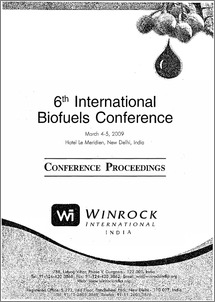Harnessing the Potential of Jatropha and Pongamia Plantations for Improving Livelihoods and Rehabilitating Degraded Lands
Abstract
Current increase in demand of knowledge for alternative sources to fossil fuel has triggered lot of interest in use of non-edible oils as green knowledge source in de;eloped and developing countries. ICRISAT is adopting pro-poor bio-fuel strategy to benefit vulnerable sections of the society through development of degraded common property resources and individual lands which are not suitable for food production by adopting consortium approach. Research and development options for harnessing the potential of Jatropha and Pongamia are undertaken to increase productivity of Jatropha and Pongamia plantations. Large vmiability in the accessions of Jatropha and Pongamia was observed for total oil content varying from 27.4% to 40.6% in case of Jatropha and from 21 to 41 % in case of Pongamia. These accessions are evaluated for different agronomic characters along with yield potential under rain-fed conditions at ICRISAT, Patancheru, India. Application of nitrogen and phosphorus at different levels .indicated that during the 4'h year harvest index (pod to seed ratio) varied from 53-56% with different fertilizer treatment. The plant yield of Jatropha within an accession with 3x2 spacing varied upto 1.4 to 1.6 kg ha per plant (2.3 to 2.7 t ho

